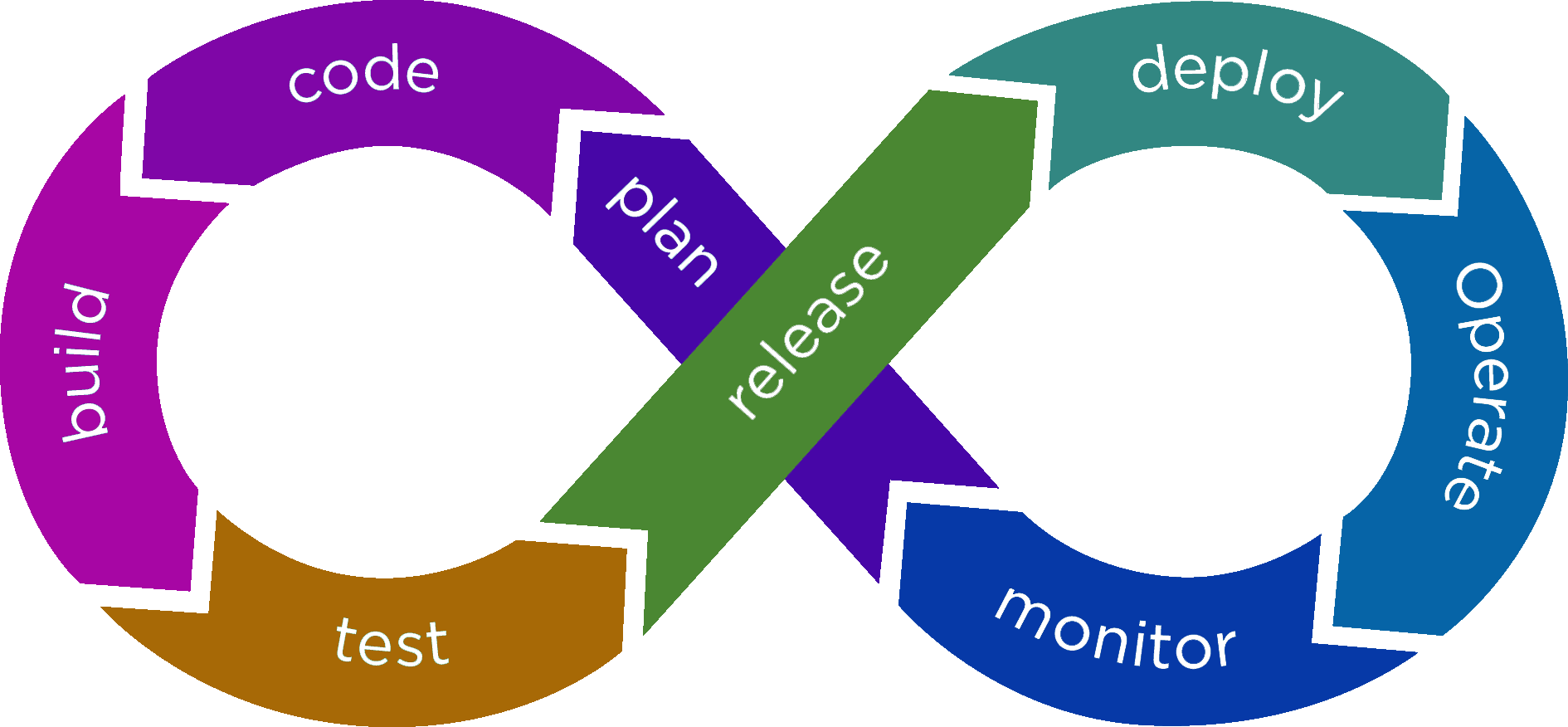Concept – But what is DevOps?
DevOps is a term derived from the combination of “development” and “operations” that represents an engineering philosophy consisting of a collaborative approach between the software development (Dev) team and the software operations (Ops) team.
In its broadest meaning, DevOps is a culture. The aim of this type of methodology is to increase communication and trust between developers and system administrators, i.e. to integrate the operations and development departments. At Geko Cloud we use agile methodologies and we integrate ourselves in all stages of the application lifecycle to deliver products as quickly as possible and manage all incidents that may arise to make the appropriate corrections in each situation.
DevOps model
With a DevOps model, the development process, from the idea to the software in production, provides organisations an increased organisational capacity when developing an application and, as a consequence, offers an increase in speed and added value that allows companies to compete more efficiently.
DevOps practices
To establish a correct link between development and operations, DevOps engineers have to carry out different specific techniques. Some of the most recommended for the implementation of the aforementioned concepts are continuous integration and deployment, APIs or microservices, monitoring, systems as a code, communication, and collaboration. With all this, development and operations engineers will be much more efficient when working on any project and, therefore, it will make it faster to develop the overall application as a whole.
Advantages of using DevOps
As we mentioned before, applying the DevOps methodology in a company will bring many benefits when it comes to working and creating tools applying agile methodologies.
 Communication and collaboration: The cornerstone of applying the DevOps methodology correctly is good communication and collaboration between developers and operators (and even other teams), establishing a workflow that improves productivity and software delivery processes through builds, validations and deployments.
Communication and collaboration: The cornerstone of applying the DevOps methodology correctly is good communication and collaboration between developers and operators (and even other teams), establishing a workflow that improves productivity and software delivery processes through builds, validations and deployments.

Speed: Another benefit is the delivery of frequent updates, which generates less downtime and, above all, allows problems to be solved in less time. DevOps practices help to develop and improve the product faster, which directly affects its marketability and is a competitive advantage.
 Agility: Development using agile methodologies is complemented by the DevOps philosophy to optimise the entire software development cycle through to deployment, with an emphasis on iterative, incremental, and evolutionary development, combined with infrastructure provisioning, continuous monitoring, and supporting applications in a production environment. All this in an automated way.
Agility: Development using agile methodologies is complemented by the DevOps philosophy to optimise the entire software development cycle through to deployment, with an emphasis on iterative, incremental, and evolutionary development, combined with infrastructure provisioning, continuous monitoring, and supporting applications in a production environment. All this in an automated way.
 Security: With the increasing number of threats, securing the application is one of the most important aspects. With a DevOps model we can use a set of tools to perform automated security tests integrated with our continuous integration process, ensuring the security of our platform.
Security: With the increasing number of threats, securing the application is one of the most important aspects. With a DevOps model we can use a set of tools to perform automated security tests integrated with our continuous integration process, ensuring the security of our platform.
 Customer first: Thanks to agile methodologies this is easier than ever, as by continuously integrating and deploying, changes in customer tastes can be detected quickly, adapting the application to them in a fast and agile way.
Customer first: Thanks to agile methodologies this is easier than ever, as by continuously integrating and deploying, changes in customer tastes can be detected quickly, adapting the application to them in a fast and agile way.
How CI and CD improve your development cycle
DevOps practices such as continuous integration and continuous delivery enable DevOps teams to deliver code quickly, regularly, securely and reliably.
Continuous integration is an agile software development practice where code changes are introduced and merged into a common repository, and the consistency of that integration is verified by automated testing to detect any bugs in the application.
On the other hand, continuous deployment goes one step further, taking care of the deployment of the new code as well as the provisioning of any necessary infrastructure, all in an automated way to make the process secure, and can even integrate an automatic rollback policy if something doesn’t go according to plan.
In summary, CI/CD enables DevOps teams to frequently validate and deliver applications to the end user through automation throughout the application lifecycle, from development to production deployment. Common tools for CI, CD or both include Jenkins or Spinnaker, as well as proprietary version control platform solutions such as Github actions or Bitbucket pipelines, to name a few.
With Geko, your deployment will stop being manual, repetitive, and error-prone and become automated, fast, and secure.
Geko and DevOps
At Geko Cloud we are specialists in Internet platforms, cloud infrastructure management and microservices. 👉 Contact us without any commitment.
[:es]

